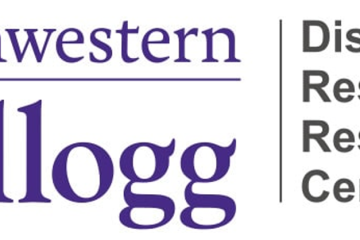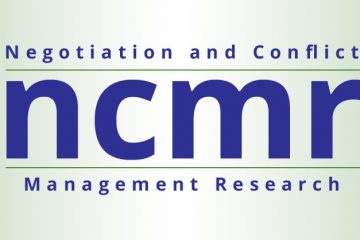NCMR 14.1 Table of Contents

Dear IACM members,
Hope you are all staying safe and healthy.
I’m pleased to let you know that Negotiation and Conflict Management Research (NCMR) has completed its transition from a traditional journal published by Wiley to a diamond open science open access (OS-OA) journal published by IACM with support from Carnegie Mellon University Library Publishing Service (CMU LPS). I’d like to invite you to visit NCMR’s new website: https://lps.library.cmu.edu/NCMR/, where you will find the NCMR’s mission statement and scope of publication, as well as various other resources for authors, reviewers, and readers.
I’d like to thank my Associate Editors, Dr. Lan Ni and Dr. Jimena Ramirez Marin; Advisory Editor, Dr. Michael Gross; and Editorial Assistant, Alicia Utecht, for their hard work in this transition. I’d also like to extend my thanks to IACM leaders and the IACM Publications Committee (especially Zoe Barsness, Taya Cohen, Brandon Charpied, Jennifer Parlamis, Noam Ebner, Cynthia Wang, and Niro Sivanathan), for their tremendous support and facilitation. We are deeply grateful to the Kellogg Dispute Resolution Research Center at Northwestern University (led by Cynthia Wang), Carnegie Mellon University Library Publishing Service (led by Rikk Mulligan, David Scherer, and Ryan Splenda), and the IACM membership for their support and sponsorship of NCMR.
NCMR continues to promote rigorous, ethical, and impactful research on negotiation and conflict, especially research that reflects interdisciplinary and international collaborations. To facilitate your visit to the new website, I highlight the key sections below:
- The Mission and Scope section provides a succinct overview of the types of research that NCMR publishes, the initial efforts that NCMR are investing in promoting OS research, and NCMR’s ranking.
- The Open Research section introduces the new OS-OA features of NCMR.
- The Publication Ethics section summarizes the ethical standards of NCMR: the code of conduct required by the American Psychological Association’s Ethical Principles of Psychologists and by the Committee on Publication Ethics (COPE).
- The Guidelines section provides the guidelines for authors, reviewers, and special issue editors, including the copyright (CC BY NC 4.0) and the review process.
- The Submission section details the requirements for manuscripts and the submission steps.
- Here comes the best: All articles and issues that have been published by NCMR since its inauguration up to those that have been accepted and have not been arranged in issues are available for view and download in the Articles and Issues sections.
- The Featured Articles section on NCMR’s Homepage specifically highlights the most recently accepted articles that appear first online.
I’m delighted that NCMR has finished this first step in its transition. We expect more exciting developments to unfold. We want to thank you for your continued patience and understanding, and we especially thank our authors and reviewers for their willingness to work with us and adapt to the new Janeway system that the journal is built on. In the coming months, we will continue to refine the look and usability of the journal articles and NCMR website to include additional features.
As a new OS-OA journal, NCMR has much to learn. Please share your thoughts and suggestions with me and the rest of the editorial team. You will find our contact info on the website as well.
Without further ado, please allow me to introduce below our brand-new first OS-OA issue: NCMR 14(1). Kudos to our own Brandon Charpied, whose diligent work has facilitated the production of this issue.
Thank you all and wish you continued health and peace,
Qi
Dr. Qi Wang
Editor-in-Chief, Negotiation and Conflict Management Research (NCMR)
ncmr@villanova.edu
In Issue 14(1), four articles are included.
Paul, G.D. (2021). The influence of belief in offender redeemability and decision-making competence on receptivity to restorative justice. Negotiation and Conflict Management Research, 14(1), 1-20. https://doi.org/10.1111/ncmr.12176
Abstract: Restorative justice (RJ) processes offer a way to address multifaceted harms caused by wrongdoing. Yet, questions remain about people’s attitudes toward restorative processes such as victim–offender conferences (VOCs) and the factors that influence those attitudes. This study examined whether beliefs about youth and adult redeemability and decision‐making competence influence perceptions of justice outcomes, VOC effectiveness, VOC appropriateness, VOC support, and VOC participation willingness. Analysis of survey data gathered from 207 participants through Amazon MTurk suggests that perceived redeemability and to a lesser extent decision‐making competence significantly shape outcome‐ and process‐related beliefs and evaluations. Namely, the more people believe that offenders are redeemable, the more they are likely to support restorative outcomes, perceive VOCs to be effective and appropriate, support the use of VOCs, and be willing to participate in a VOC. The study’s findings are useful for potentially shaping people’s understanding of and support for RJ.
Schiff, A. (2021). Readiness theory: A new approach to understanding mediated prenegotiation and negotiation processes leading to peace agreements. Negotiation and Conflict Management Research, 14(1), 21-39. https://doi.org/10.1111/ncmr.12175
Abstract: Two main theoretical strands suggest causal explanations for the shifts in the de-escalation dynamics of conflicts, in which parties that had been unwilling to sit together at the negotiating table ultimately agreed to do so and eventually signed an agreement. The first is the ripeness strand which embodies three loosely related subtheories, and the second, a corollary of it, is the readiness strand which is based on readiness theory. By applying readiness theory to two case studies of mediated negotiations which ended in agreement in Aceh (2005) and Sudan (2005), this study illustrates the value of the readiness strand as an integrative analytical framework for examining the negotiation process from prenegotiation to negotiation and agreement. This type of multicausal and dynamic analysis, which considers gradual changes in the variables throughout the process, offers insights for researchers as well as for practitioners.
Manata, B. (2021). Investigating the impact of racial diversity in decision-making groups: The moderating role of relationship conflict. Negotiation and Conflict Management Research, 14(1), 40-50. https://doi.org/10.1111/ncmr.12173
Abstract: To date, numerous research endeavors have documented both the positive and negative effects of racial diversity on numerous group-level performance outcomes. Indeed, a reading of the racial diversity literature would lead one to make one of two contradictory predictions regarding the effects of racial diversity in groups. In the interest of solving this theoretical issue, both perspectives were synthesized, such that racially diverse groups were expected to outperform homogeneous groups when performing a decision-making task, but only when relationship conflict between members was minimized. In addition, the association between racial diversity and decision-making quality was expected to be negative when relationship conflict between members was high. A study is reported which investigates the validity of and finds general support for this proposition (i.e., racial diversity in groups increased the group’s ability to make accurate decisions, but only under conditions in which relationship conflict between group members was kept to a minimum). A discussion is offered in which the implications of these results are entertained.
Cai, D.A., Fink, E.L., & Walker, C.B. (2021). Robert R. Blake, with recognition of Jane S. Mouton. Negotiation and Conflict Management Research, 14(1), 51-59. https://doi.org/10.1111/ncmr.12151
Abstract: This article reviews the life and contribution of Dr. Robert R. Blake, who received the Lifetime Achievement Award in 1994 from the International Association for Conflict Management for his pioneering work and prolific career in the field of conflict management. As a longtime co-author and collaborator, Dr. Jane S. Mouton certainly would have been joint recipient of this award if it were not for her death in 1987: The vast majority of their research was published together. Jane Mouton and Robert Blake became famous for their promotion of the Managerial Leadership Grid and through their work as consultants to a variety of professions and organizations. But there is much more to Robert Blake’s career and contributions than the Grid. Together, Blake and Mouton were tremendously influential in their work on managerial leadership and organizational development.


